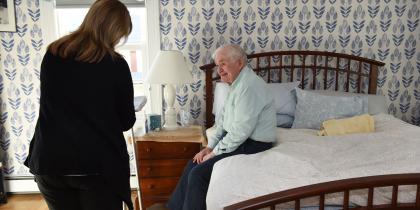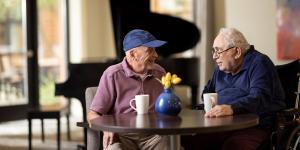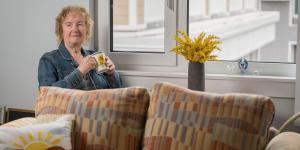Aging Safely at Home
An expert explains how seniors can safely age in place

Given the choice, older adults prefer to remain in their own homes as they age. However, changes in health and functional status can often put a senior at risk. A home safety evaluation is a good place to start to help ensure that the home environment is comfortable, secure and safe where seniors can age in place safely. I spoke with Heather Margulis, Associate Director, Rehabilitation Services for Hebrew SeniorLife, to learn more about in-home safety and what to expect from a home safety evaluation.
Q. What triggers a home safety evaluation?
A. There are a number of reasons a home evaluation may be recommended for an older adult— chief among them:
- Discharge from an acute care hospital or rehab facility and change in a related function
- Multiple falls, particularly within a short period of time
- Change in eyesight, hearing, or medication
- Change in functional status due to a chronic condition
Referrals come from a variety of sources including physicians, discharge planners, social workers, home health clinicians or private care providers.
In HSL’s senior living communities we work as a team across disciplines. It is everyone’s job to recognize hazards and suggest an evaluation if a resident appears to be at risk.
Q. What does a home evaluation look like?
A. With our service, a therapist goes to the home and inspects every room with the resident, observing how they negotiate the space and asking questions about what they normally do in each room. The therapist checks for safety and makes recommendations to reduce risk of injury.
Q. What are the top in-home safety risks for seniors?
Falls, by far, pose the greatest risk to a senior’s safety, health and wellbeing. Common causes of falls include:
- Tripping hazards, including throw rugs, wires and cords that are not secure
- Cluttered pathways
- Bathroom set-up —no grab bars or grab bars that are not in the right place; toilets that are too low; tubs, which are difficult to get in and out of, versus a shower chair
- Cabinets and closet shelves that are too high
- Poor lighting
Q. What are some examples of modifications that can improve safety?
A. Common examples include:
- In the bathroom — install a shower chair and properly placed grab bars
- In the bedroom —lower closet rods if range of motion is a problem; make sure bedspreads are not left hanging on the floor; make sure pathways are kept clear, especially between the bedroom and bathroom
- In the kitchen—make sure frequently used items are available at waist level and stove knobs are adjusted so they are easier to turn
- Throughout the home —Make sure step stools, if needed, are being used safely; use a reacher to pick up things off the floor; wear well-fitted footwear with rubber soles; keep the phone and frequently used items like eyeglasses within easy reach; when carrying items, make sure they are balanced and not loaded on one side of your body
We also coach seniors to take steps themselves to reduce the risk of falls. We tell them to slow down! Sudden changes in position, such as getting out of bed or up from a table can cause a drop in blood pressure and a person to feel dizzy or faint.
But perhaps most important —we promote exercise as the best intervention to help older adults stay balanced and strong.
And last, but not least, use a lifeline that you can push to summon help if you fall and are unable to get up.
We believe with modifications in the home—and exercise—seniors can maintain independence throughout their lives.
Blog Topics
Learn More
Help at Home
Hebrew SeniorLife is known for delivering the highest quality health care to older adults, and our in-home care services are no exception. Whether it's nursing care or rehabilitative therapies, we work closely with you to set personal goals for care.



